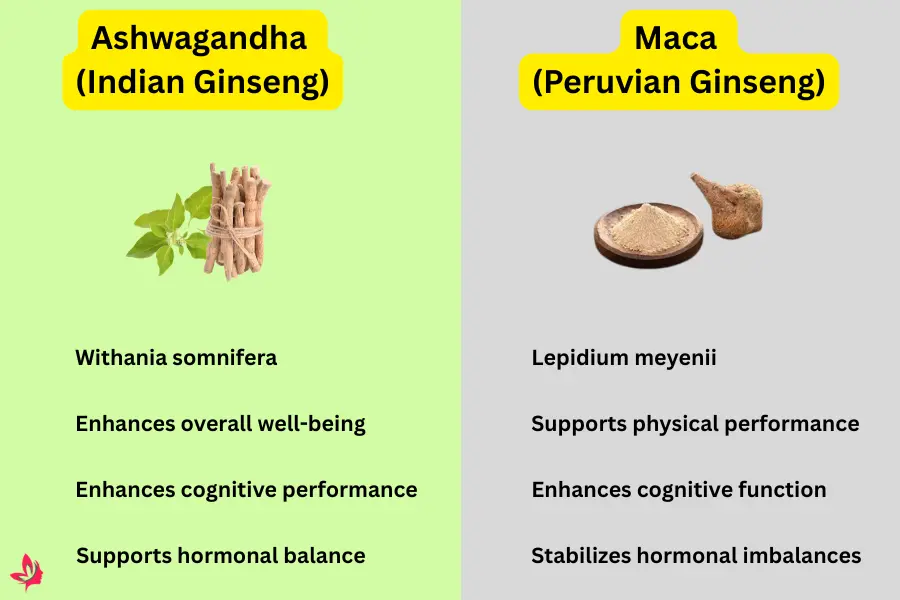Ashwagandha and maca together benefits can offer a powerful boost that enhances your daily health routine. If stress or low energy overwhelms you, exploring these two adaptogenic herbs might be the solution.
Combining ashwagandha and maca can help increase energy, reduce stress, and improve stamina, making them a valuable addition to a balanced lifestyle.
Both ashwagandha and maca have long histories in traditional medicine to promote vitality and balance. Ashwagandha is well-known for its ability to reduce stress and anxiety, while maca is celebrated for its energizing properties.
When taken together, they can complement each other’s strengths and multiply the benefits.
The potential for improved mood, endurance, and well-being is compelling for those interested in harnessing these herbs’ joint effects.
To learn more about their qualities and how they work in harmony, consider reading about their advantages and specific use cases.
The Synergistic Health Benefits of Ashwagandha and Maca Root Together

Ashwagandha and maca root are powerful adaptogens renowned for their unique health benefits. They offer various advantages, from enhancing energy levels to improving hormonal balance and reproductive health.
Enhancing Energy Levels and Physical Performance
Maca root, often called Peruvian ginseng, is known for its ability to boost energy and physical performance. It supports oxygen use and stamina, which can be especially beneficial at high altitudes.
Combined with ashwagandha, also known as Indian ginseng, they can enhance athletic performance by increasing muscle strength and improving endurance.
These adaptogens help regulate cortisol levels, leading to better stress management and energy enhancement throughout the day.
Boosting Cognitive Function and Mental Clarity
Combining ashwagandha and maca root may significantly benefit brain function. Ashwagandha has been shown to reduce stress hormones and improve cognitive performance.
It can help with stress relief and reduce anxiety levels.
Meanwhile, maca root contributes to mental clarity by maintaining a healthy nervous system. These herbal supplements promote better sleep, mood stability, and cognitive function, making them a popular choice for those seeking to enhance mental sharpness and focus.
Improving Hormonal Balance and Reproductive Health
The adaptogenic properties of ashwagandha and maca root make them effective in improving hormonal health.
Ashwagandha is known for balancing stress levels, while maca supports reproductive health by enhancing testosterone levels and addressing hormonal imbalances.
They’ve shown potential in reducing menopausal symptoms and boosting male fertility.
Incorporating these natural supplements into one’s daily routine can improve hormonal balance and overall well-being for those concerned with hormonal health.
How Ashwagandha and Maca Root Support Stress Relief and Emotional Well-being

Ashwagandha and maca root, often known as adaptogenic herbs, are popular for managing stress and boosting emotional well-being. They are believed to help balance hormones, improve mood, and reduce anxiety.
Reducing Cortisol Levels and Managing Stress
Ashwagandha is known to lower cortisol levels in the body. Cortisol, often called the “stress hormone,” affects how the body responds to stress.
High levels of cortisol can lead to anxiety, weight gain, and fatigue. Ashwagandha reduces cortisol, helping relieve stress and promote a calm mind.
Maca root, on the other hand, is believed to boost energy and improve endurance, assisting in handling stress more effectively. These powerful adaptogens provide comprehensive support for stress management and emotional well-being.
Alleviating Anxiety Levels and Promoting Better Sleep
Anxiety is a common concern that can affect sleep and quality of life.
Ashwagandha may offer benefits for anxiety relief due to its calming effects on the nervous system.
It also supports better sleep by promoting relaxation and reducing restlessness, which can be helpful for individuals experiencing sleep disturbances.
Maca root complements these effects by further enhancing sleep quality.
The adaptogenic properties of maca contribute to a restful night’s sleep, allowing the body to recover and rejuvenate.
This combination makes both herbal supplements effective in alleviating anxiety levels and improving sleep.
Combating Low Mood and Enhancing Overall Mood
Ashwagandha and maca have been used to combat low mood.
Ashwagandha, sometimes called Indian ginseng, provides a natural way to uplift mood. It is known for its positive effects on mood swings and mental clarity.
Maca, or Peruvian ginseng, supports emotional health by enhancing mood and energy levels.
It helps to balance the adrenal glands, which are crucial for maintaining a stable mood.
These adaptogenic herbs offer a practical approach to managing low mood and enhancing emotional well-being.
Exploring the Adaptogenic Properties of Ashwagandha and Maca Root

Ashwagandha and maca root are renowned for their adaptogenic properties. These herbs help relieve stress, enhance energy, and balance hormonal levels.
The Role of Adaptogenic Herbs in Modern Wellness
Adaptogenic herbs like ashwagandha and maca root are pivotal in modern wellness because they help the body resist stress.
Adaptogens support the adrenal glands, regulating cortisol levels and stabilizing mood swings. These herbs also contribute to better sleep and cognitive function.
Enhancing physical performance and boosting energy offers a natural and effective way to improve overall health.
Unlike many medications, adaptogens provide a holistic approach to wellness by not targeting just one symptom.
Benefits of Ashwagandha: Indian Ginseng and Withania somnifera
Ashwagandha, often called Indian ginseng, is a powerful adaptogen known for its stress-relieving properties. This herbal supplement is particularly beneficial in reducing anxiety levels and lowering stress.
It also supports hormonal balance, which is crucial for reproductive health and improving testosterone levels.
Withania somnifera, the plant’s scientific name, plays a significant role in muscle strength and cognitive performance.
Organic ashwagandha supplements can also improve sleep quality, making them popular among those looking to enhance their overall well-being.
Benefits of Maca: Peruvian Ginseng and Lepidium meyenii
Maca, known as Peruvian ginseng, is celebrated for its energy-boosting abilities. This herb, scientifically called Lepidium meyenii, is used for its wide range of health benefits.
It helps stabilize hormonal imbalances, thus aiding in reproductive and sexual health, especially in postmenopausal women.
Rich in nutrients, maca can enhance mood, energy, and cognitive function.
These properties make it a favored option for those seeking to improve their physical and mental performance, supporting the body and mind.
Potential Side Effects and Considerations When Taking Ashwagandha and Maca Root

Ashwagandha and maca root are popular adaptogens known for their health benefits, including stress relief and energy boost.
While they can offer many positive effects, it’s essential to be aware of possible side effects and interactions, recommended dosages, and the importance of consulting a healthcare provider.
Understanding Possible Adverse Effects and Interactions
Taking ashwagandha may interact with certain medications, especially those affecting thyroid hormones. High levels of these hormones can lead to health concerns like anxiety and weight gain.
Maca, known as Peruvian ginseng, might not be suitable for people with thyroid issues due to its goitrogenic properties.
Combining these herbs with other supplements or medications requires caution to avoid unexpected side effects.
Recommended Dosage and Best Time of Day to Take
Adhering to the recommended dosage is crucial for optimal benefits and minimal side effects.
Ashwagandha supplements are typically taken at 300-500 mg daily doses. Maca root, available in powder or capsule form, ranges from 1.5 to 3 grams daily.
It’s usually recommended to take these supplements with meals to aid absorption. The best time of day may vary based on personal preferences and lifestyle.
Consulting with a Healthcare Provider Before Use
Speaking with a healthcare provider ensures the safe use of these herbal supplements, especially for those with medical conditions or who are pregnant.
A professional can evaluate potential interactions with current medications or health concerns.
This advice is critical for individuals with hormonal imbalances, as ashwagandha and maca influence cortisol and testosterone levels, impacting overall hormonal balance.
Real-Life Benefits and Success Stories of Combining Ashwagandha and Maca Root

Ashwagandha and maca root, two powerful adaptogens, are celebrated for their unique benefits when used together. They enhance energy levels, boost physical performance, and support hormonal balance.
Testimonials of Improved Energy and Physical Performance
Many individuals report that taking ashwagandha and maca root in their daily routine has significantly improved their energy levels and physical performance.
Athletes and fitness enthusiasts have noted enhanced endurance and muscle strength. These herbs, known for their adaptogenic properties, help manage stress levels, allowing users to experience sustained energy throughout the day.
Individuals seeking to improve their reproductive health have also seen success.
Testimonials from men report increased testosterone levels and improved male fertility, while women have experienced more balanced hormonal health and reduced menopausal symptoms.
Clinical Trials and Research on Ashwagandha and Maca Together Benefits
Research suggests potential benefits when combining ashwagandha and maca root. Both are adaptogenic herbs. They are shown to enhance cognitive function and manage anxiety levels.
In a notable clinical trial, participants using these herbal supplements experienced significant improvement in their stress relief, indicating reduced cortisol levels.
Other studies examine their impact on physical performance and hormonal balance. Integrating these herbs can aid hormonal imbalances while supporting overall health.
While more data is needed, initial findings show promise for those using ashwagandha supplements and maca in tandem to enhance their health and vitality.
Always consult a healthcare provider before starting any new supplement to ensure it is appropriate for your individual health concerns and conditions.
Final Thoughts
Ashwagandha and maca together provide several advantages for those looking to boost their overall well-being. Together, these herbs can enhance energy and stamina, making them a popular choice for those seeking a natural way to improve their daily vitality.
By combining ashwagandha’s stress-reducing effects with maca’s ability to support energy levels, individuals may find a balanced approach to handling everyday pressures.
Both herbs are rooted in traditional medicine and have been valued for their potential health benefits.
Anyone considering this herbal duo should consult with a healthcare professional to ensure it aligns with their personal health needs and goals.
Embracing these herbs as part of a healthy lifestyle can be a step toward improved physical and mental resilience.
Key Takeaways:
- Enhanced Energy: Combined use can boost vitality.
- Stress Management: Ashwagandha helps in reducing stress.
- Potential Benefits: Supported by traditional medicine practices.
- Consultation: Always seek professional advice.
This consideration provides a foundation for exploring herbal alternatives to support various aspects of well-being.
Frequently Asked Questions
Combining ashwagandha and maca may enhance energy, improve stress management, and support sexual health. For those considering this combination, it’s crucial to understand how each herb functions, its potential interactions, and its effects on the body.
Is it okay to take maca and ashwagandha together?
Yes, it is generally safe to take maca and ashwagandha together. Both herbs are known for their complementary benefits, such as boosting energy and reducing stress. However, for personalized advice, it is recommended that you consult with a healthcare provider.
What does Ashwagandha do for men in bed?
Ashwagandha is believed to enhance sexual performance for men by improving energy levels and reducing stress. These factors can contribute to a more satisfying experience in bed.
What should you not mix Ashwagandha with?
Avoid mixing ashwagandha with medications such as sedatives or immunosuppressants. It is advisable to discuss any medication interactions with a healthcare professional.
How long does it take for Maca to kick in?
Maca’s effects can vary, but some individuals may notice increased energy within a few days. For others, it may take several weeks to experience the full benefits.
What to avoid when taking maca?
When taking maca, avoid consuming large amounts if you have thyroid issues, as it contains goitrogens. It’s best to consult a healthcare provider for guidance, especially if you are pregnant or breastfeeding.
What is the best combination for Ashwagandha?
Ashwagandha is often combined with other adaptogens like rhodiola or holy basil for enhanced stress relief. The combination with maca is popular for balancing energy and reducing stress.
Does maca increase testosterone?
Maca may help to boost libido and improve sperm health, but evidence directly linking maca to increased testosterone levels is limited. Further research is needed to confirm this effect.
What are the side effects of ashwagandha maca?
Potential side effects of ashwagandha and maca include digestive upset, headaches, and changes in sleep patterns. Monitoring adverse reactions and consulting a healthcare professional if necessary is crucial.
How much ashwagandha per day?
A typical dosage for ashwagandha is between 300-500 mg per day, typically taken in two doses. However, it’s crucial to follow product-specific guidelines and advice from a healthcare provider.
Is maca root good for anxiety?
Maca root may help reduce anxiety, boost energy, and balance mood. However, it is not a substitute for professional treatment; it may provide supplementary support for stress management.




